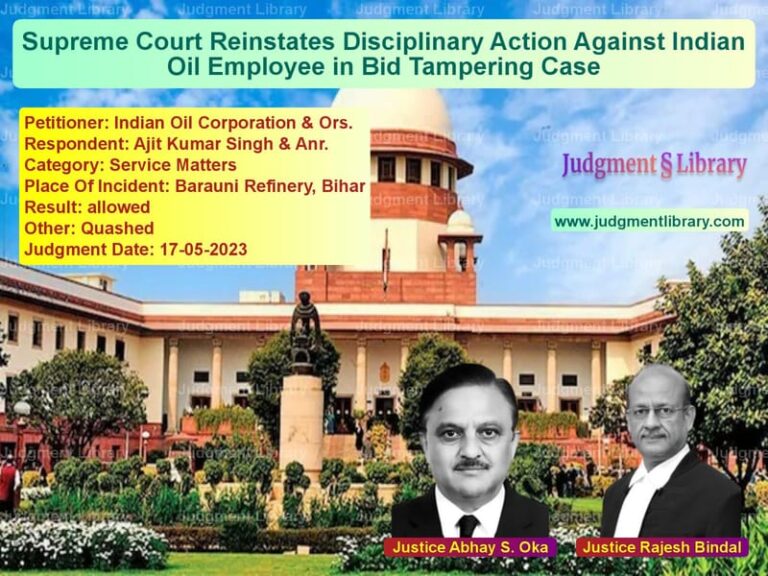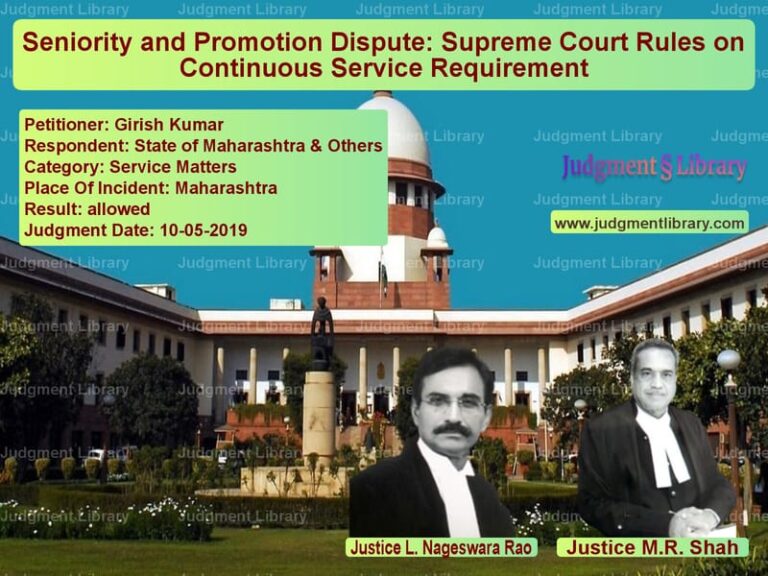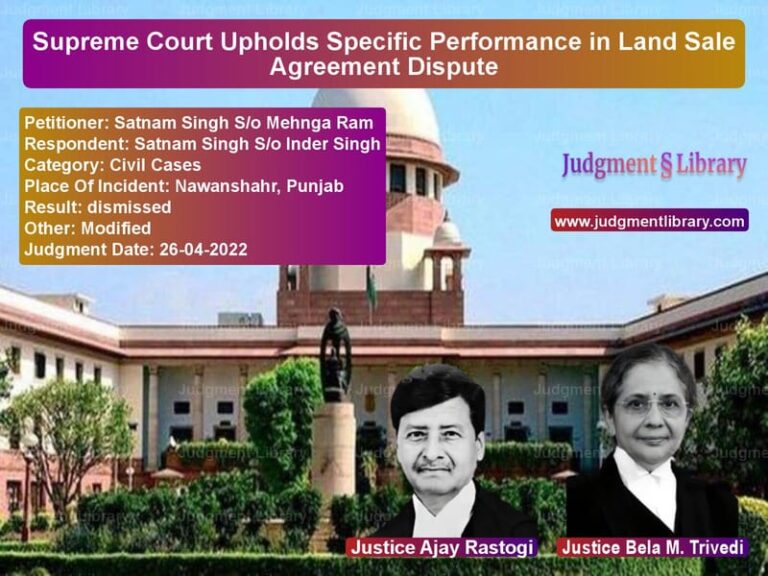Compensation for Motor Accident Victims: Supreme Court Ruling on Future Prospects and Disability Assessment
The Supreme Court of India recently delivered a critical judgment in the case of Pappu Deo Yadav vs. Naresh Kumar & Ors., addressing the issue of compensation for motor accident victims, particularly in cases involving permanent disability. The case is significant for clarifying the legal principles regarding the assessment of future prospects and the extent of disability in determining just compensation.
The judgment emphasizes that victims of motor accidents suffering from permanent disability should not be deprived of compensation for loss of future prospects. The Court also provided clarity on the methodology for assessing the impact of disability on a victim’s earning capacity.
Background of the Case
The case arose from a motor accident on May 18, 2012, in which the appellant, Pappu Deo Yadav, was injured while traveling as a passenger in a bus. The accident occurred when the driver of another bus attempted to overtake from the wrong side, causing a collision. As a result, the appellant suffered severe injuries, leading to the amputation of his right upper limb.
The appellant, who was working as a data entry operator/typist at Tis Hazari Courts, Delhi, earning ₹12,000 per month, filed a compensation claim under Sections 166 and 140 of the Motor Vehicles Act, 1988, seeking ₹50 lakhs with interest at 12% per annum.
Motor Accident Claims Tribunal (MACT) Decision
The Motor Accident Claims Tribunal awarded compensation as follows:
- Medical expenses: ₹11,000
- Pain and suffering: ₹30,000
- Special diet, attendant, and conveyance charges: ₹30,000
- Loss of future earning capacity/income: ₹11,66,400
- Loss of amenities and enjoyment of life: ₹15,000
- Compensation for disfigurement: ₹25,000
- Loss of income during treatment: ₹48,000
- Future medical expenses: ₹1,00,000
- Total Compensation: ₹14,25,400
The MACT assessed the appellant’s income at ₹8,000 per month, adding 50% towards future prospects and applying a multiplier of 18. The physical disability was assessed to be 45%.
High Court Decision
The appellant and the insurer appealed to the Delhi High Court. The High Court revised the compensation as follows:
- Removed the 50% addition for future prospects
- Revised the loss of earning capacity to ₹7,77,600 (₹8,000 × 12 × 45% × 18)
- Enhanced compensation for disfigurement, special diet, attendant, conveyance, and pain and suffering
- Total Compensation: ₹14,36,600 with 9% annual interest
The High Court ruled that compensation for future prospects was not applicable in cases of permanent disability, relying on the judgment in Pranay Sethi. The Court also reduced the assessment of disability to 45%.
Supreme Court’s Ruling
The Supreme Court held that the High Court’s exclusion of future prospects was incorrect. The Court reaffirmed that victims of permanent disability are entitled to compensation for future prospects and set aside the reduction in compensation.
Key Findings:
- The High Court’s reading of Pranay Sethi was incorrect. Compensation for future prospects applies to both death and permanent disability cases.
- The assessment of loss of earning capacity should consider the victim’s actual income, not an arbitrarily reduced amount.
- The disability percentage should reflect the impact on earning capacity, not just the medical assessment.
Final Compensation Awarded by the Supreme Court
- Loss of future earning capacity (adjusted for future prospects): ₹19,65,600 (₹14,000 × 12 × 65% × 18)
- Compensation for medical expenses, pain and suffering, special diet, conveyance, and loss of amenities remained unchanged.
Legal Significance of the Judgment
This ruling sets an important precedent in motor accident claims:
- Future Prospects: The Court reaffirmed that compensation for loss of future prospects should be included in cases of permanent disability.
- Assessment of Disability: The impact on earning capacity should be the primary factor in determining disability percentage.
- Fair Compensation: Courts must ensure that victims are adequately compensated to maintain their dignity and quality of life.
Conclusion
The Supreme Court’s judgment in this case reaffirms the principle that compensation should be just and reasonable, ensuring that accident victims are placed in a position as close as possible to what they would have been in had the accident not occurred. By reinstating future prospects and correcting the disability assessment, the Court upheld the rights of accident victims to fair compensation.
Petitioner Name: Pappu Deo Yadav.Respondent Name: Naresh Kumar & Ors..Judgment By: Justice L. Nageswara Rao, Justice Krishna Murari, Justice S. Ravindra Bhat.Place Of Incident: Hafizpur, Hapur, Uttar Pradesh.Judgment Date: 17-09-2020.
Don’t miss out on the full details! Download the complete judgment in PDF format below and gain valuable insights instantly!
Download Judgment: Pappu Deo Yadav vs Naresh Kumar & Ors. Supreme Court of India Judgment Dated 17-09-2020.pdf
Direct Downlaod Judgment: Direct downlaod this Judgment
See all petitions in Compensation Disputes
See all petitions in Motor Vehicle Act
See all petitions in Negligence Claims
See all petitions in Damages and Compensation
See all petitions in Road Accident Cases
See all petitions in Judgment by L. Nageswara Rao
See all petitions in Judgment by Krishna Murari
See all petitions in Judgment by S Ravindra Bhat
See all petitions in partially allowed
See all petitions in Modified
See all petitions in supreme court of India judgments September 2020
See all petitions in 2020 judgments
See all posts in Accident Cases Category
See all allowed petitions in Accident Cases Category
See all Dismissed petitions in Accident Cases Category
See all partially allowed petitions in Accident Cases Category







